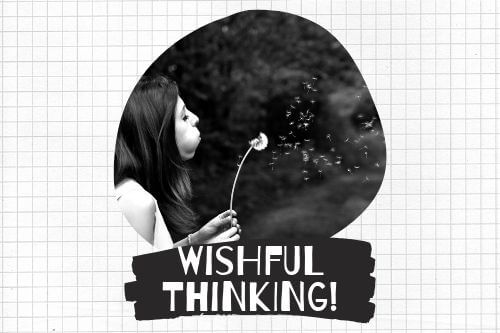
YouTube / iTunes / Spotify / Radio Public / Pocket Casts / Google Podcasts / Breaker / Overcast
Listen to ArtisanEnglish.jp posts & lesson intros here.
WotD: Wishful thinking
Today is Monday!
This is going to be the best week of your life!
You’ll get that promotion you’ve always wanted, win the lottery and find ¥50,000 between the sofa cushions.
Then again, it could all be wishful thinking.
Wishful thinking is thinking or talking about bizarre things happening in the future as if they really could happen.
It would be nice if all of that could happen to you today.
If it did, imagine what could happen tomorrow.
Sometimes, it’s nice to talk about outlandish future events as if they really could happen.
It’s called wishful thinking.
In some ways, wishful thinking is similar to dreaming about the future.
If I had to choose a difference, I would say that dreams do come true occasionally, whereas wishful thinking is often just that – dreams.
It does help us get through the humdrum existence of daily life, though.
When I let my mind wander and get to wishful thinking, I like to see myself as a millionaire who runs a small online English teaching company.
It doesn’t have to be a big company, and I don’t have to be a multimillionaire.
I imagine myself as being comfortable.
I have an excellent, easy job and a steady income.
By the time I’m fifty years old, I can enter semi-retirement.
I go online early in the morning to check that everything is working fine, then take the afternoon off and do whatever semiretired millionaires do with their afternoons.
We could also call this a pipe dream because it will probably never happen, but I’ll keep reaching in the dark, searching for the light at the end of the tunnel.
No matter what you call it, whether it’s wishful thinking, dreaming or a pipe dream, we all need something to help us get out of bed in the morning.
If we didn’t have that, we’d be lyin’ in bed just like Brian Wilson did.
Flesch-Kincaid Readability Test
This post is understandable by someone with at least a 7th-grade education (age 12).
On the Flesch-Kincaid reading-ease test, this post scores 73.
The easier a passage is to read, the higher the score on a scale of 0 – 100.

